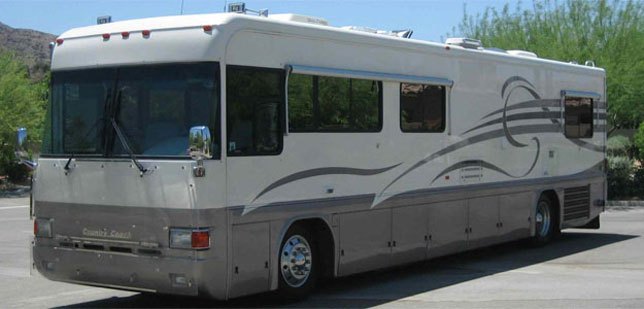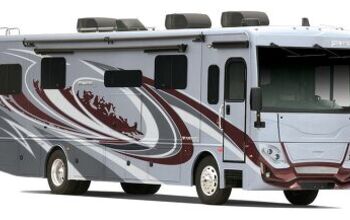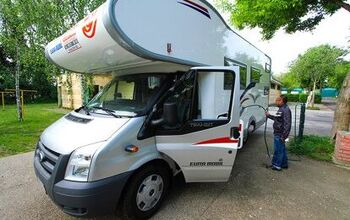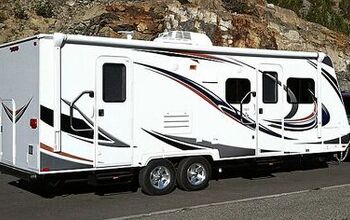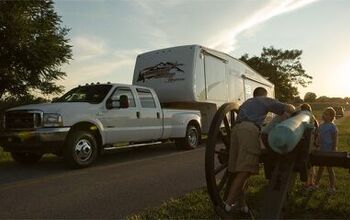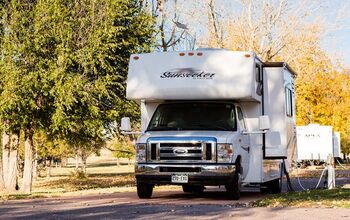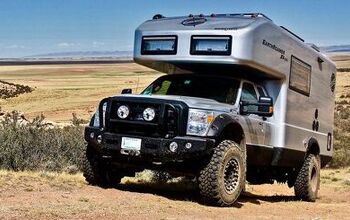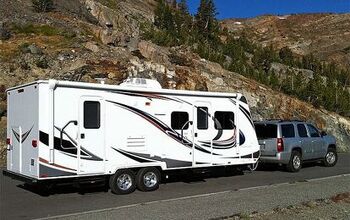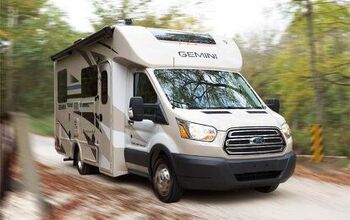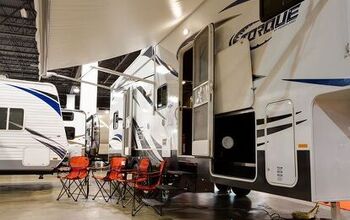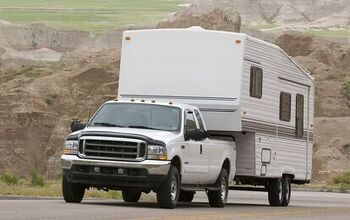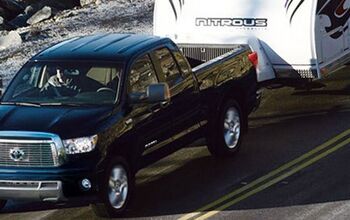Should I Buy a Gasoline Engine or Diesel?
Which is a better engine for a motorhome or towing duty – gasoline or diesel?
In contrast, diesels offer a number of advantages over gasoline engines, and likewise, depending on your priorities, gasoline engines can be seen as having several winning attributes over diesels.
For example, when you factor in a diesel’s purchase price, maintenance and operations costs, its barrier to entry is higher. But when it comes to usable power, and longevity, the debate is more one-sided in the diesel’s favor.
If cost is no object, and you want to talk about the best tool for the job, simply look at the tried and true solutions for professionals who make their living with the equipment they select.
Have you ever seen a semi tractor-trailer with a gasoline engine? How about the largest farm tractors; what kind of engines do they have? Diesel, of course.
What’s more, a diesel pusher (rear engine, rear drive) motorhome may be built on a bus chassis, instead of a modified truck chassis. They also do not have a super long driveshaft from the nose of the rig to the tail to reduce driveline efficiency and increase potential things to go wrong. These motorhomes are following the same path that Greyhound or Trailways have long since followed. In fact the most expensive motorhomes are actually converted commercial buses.
All things being equal, diesels typically have a higher resale value too, so if you paid up front, you ought to get at least some of it back if you sell it.
But – to throw a rescue line to the gasoline engine seemingly drowning in this debate – do you really need a motorhome built like a commercial bus?
What if you use your motorhome only infrequently, or for shorter trips, or you never take it to high altitudes or up steep grades like the mountains out west offer? If discussing a vehicle used for trailering, what if you only tow infrequently, or never need to pull heavy trailers at the limit of its capabilities? Then certainly a gasoline engine can suffice.
But if coming back to listing the diesel’s advantages, in a displacement-for-displacement comparison, it is no contest.
Take for example a 2010 Ford F-250 with a 6.8-liter Triton V-10 naturally aspirated gas engine and see how it stacks up against the Cummins 6.7-liter inline-six cylinder turbo diesel in the 2010 Dodge Ram 2500. Here we have nearly identical displacement, with the diesel theoretically disadvantaged by 40-percent fewer cylinders, albeit turbocharged. Take a look at the numbers: The 6.8-liter gasoline engine produces 362 horsepower at 4,750 rpm, and 457 lb-ft of torque at 3,250 rpm. In contrast, the diesel makes 350 horsepower at 3,000 rpm and 650 lb-ft of torque at 1,500 rpm.
If you’re a little fuzzy about what horsepower and torque mean, in simplified terms, torque is the measurement of force produced by the engine. It is the energy needed to perform work. When described in pounds-feet (not to be confused with foot-pounds, they are not interchangeable terms), engine torque is the amount of turning force it takes to move one pound of weight the distance of one foot. On the other hand, horsepower is a factor of torque; the actual equation is: horsepower equals torque multiplied by rpm divided by 5,252 (or, torque x engine speed / 5,252 = horsepower). In short, torque quantifies the work being performed, and horsepower is the rate at which the work is being done.
So, in analyzing the comparison between equal sized gasoline and diesel truck engines, the disparity in favor of diesels is typical.
Some might point out this may not really be a fair fight because the diesel is turbocharged and the gas engine is not. On the surface, this is true. Even so, these examples compare real competitive situations, and the facts of today: truck diesels typically are turbocharged, and if the gasoline engine were turbocharged, yes it would make more horsepower and torque, but it would also cost more, fuel economy would be even worse, and odds are it would wear out even quicker.
So, given these realities, look at how completely the diesel dominates the gasoline engine: The diesel puts out around three percent less peak horsepower, but delivers it at a much gentler pace of 37 percent lower rpm. And when it comes to torque – the real indicator of usable energy – the diesel delivers 42 percent more pounds-feet at a snail’s pace of 1,500 rpm, less than half the engine speed of the gasoline engine when delivering its peak torque.
When it comes to moving motorhomes or pulling loads, this low rpm torque figure offered by the diesel is exactly what the doctor ordered. At highway speeds, it operates in the heart of its powerband delivering maximum usable force while causing less friction on the engine’s internal components.
Less high-speed internal friction means diesels experience less wear – and beyond this basic fact, many diesels are more robustly built because they are sourced from manufacturers (such as Cummins, etc.) that also supply commercial and industrial customers. So such diesels typically last a hundred if not a few or even several hundred thousand miles longer than a comparable displacement gasoline engine all while delivering more usable power the whole time. What’s not to like? Does the phrase “you get what you pay for” start to come to mind?
But before you become convinced a diesel is in your future, remember we mentioned they come with extra up front and ongoing costs. First, just for a heavy-duty pickup truck, they can add $4,000 to over $9,000 to the final price. And when it comes to motorhomes, although a modest diesel-powered model may cost similarly to more luxurious gasoline-powered rigs, the financial hurdle between comparatively appointed RVs is typically significant.
And even if you do get a diesel, you have to properly maintain it, which means more money. For starters, diesels have an enormous oil capacity. Oil and filter changes can cost double what a comparable gasoline engine oil and filter change does. Further, if using the diesel during winter, you’ll need to drain water from the fuel filter once a month. You may also need to mix No. 1 with No. 2 diesel in freezing weather and get familiar with using plug-in AC powered block heaters just to get it fired on a cold winter morning.
Diesel engines also weigh hundreds of pounds more. One reason for their weight is they ignite their fuel under very high compression – around 17:1 is common, compared to around 9:1 for a typical naturally aspirated gasoline engine.
So diesel’s engine blocks and often cylinder heads are built of heavy cast iron to handle the pressures.
Gasoline engines, while being initially cheaper, add none of these back-end expenses, and they weigh less.
But even though a diesel’s extra weight adds to the load it must move, and the turbo allows more fuel to be crammed into the engine, when it comes to fuel costs, things still come out in a diesel’s favor. Why? Because gallon-for-gallon, diesel fuel offers more energy potential than gasoline.
However on the unfortunate side of things (for diesels), since American fuel prices raced toward $5 per gallon last year, then came back down; diesel remained relatively higher offsetting a previous advantage of fueling costs. And this may seem even more egregious if we tell you diesel oil is a simpler and less expensive to refine and produce than gasoline, yet somehow the market is charging more for it.
Oh, and while speaking of fuel, diesel smells different. Some people like the smell, others not. In any case, if you get some spilled on your skin, the odor may linger a day or two. Diesel engines also make more noise and smoke, although these issues have diminished with the latest precisely controlled designs.
Also speaking of fuel, gasoline pumps do outnumber diesel pumps, but there is a well-established infrastructure set up for tractor-trailers – even in the boondocks for tractors and work trucks, therefore finding fuel is usually not a big concern.
Which leads us back to the original question: which is better?
You decide for yourself, but by most accounts, a diesel is preferable assuming your budget allows it or needs dictate it. But if you think differently, that’s OK. Gasoline engines can work well too.
